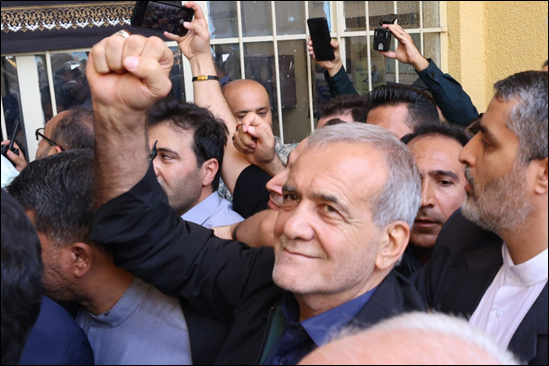Academy SITREP – Iran Elects a Reformist President

What has Happened:
- Over the weekend, it was announced that reformist candidate Masoud Pezeshkian won the runoff presidential election in Iran, beating hardliner Saeed Jalili, a former nuclear negotiator.
- Pezeshkian, a 69-year-old cardiac surgeon and member of Iran’s Parliament who also served as its First Deputy Speaker from 2016 to 2020, will replace Ebrahim Raisi who died in a helicopter crash in May.
- However, while Pezeshkian campaigned on reaching out to the West and easing enforcement of the country’s mandatory headscarf law, we do not expect any change to Iranian foreign policy at this time.
- Pezeshkian also promised no radical changes to Iran’s Shiite theocracy and believes that Supreme Leader Ayatollah Ali Khamenei has the final say in all matters of state.
- The concern is that with the election in Iran behind him, Khamenei will continue to focus on supporting Iranian proxy forces in the region, including Hezbollah, which has increased its attacks on northern Israel significantly in the past few weeks.
Why it Matters:
“It is hard to see the ‘election’ of Pezeshkian creating significant change in foreign policy or military opportunism. I suspect his mandate from the Supreme Leader and the Guardian Council is to present the smiling and benevolent face of the regime and to offer small social concessions to ease tensions in the streets. The disillusioned Iranian people know they are being placated, evidenced in their staying away from the polls in droves. Despite sanctions, Iran is still pulling in $86 billion in oil revenue per year (almost entirely from China), and has a GDP of over $410 billion. The Iranian regime has plenty of resources to continue their support of Hamas, Hezbollah, the Houthis, proxy networks in Iraq, and other global footprints. Beyond its proxies, Iran will surely continue to agitate through progress in its UAV exports, nuclear program, space capabilities, and influence in the newly expanded BRICS+.” – General Michael Groen
“I concur with General Groen. Little change should be expected. They are watching U.S. elections as they ponder how much freedom of action to give Hezbollah and the Houthis. Trump as president would likely have a tougher and more forceful approach than President Biden. I think Hezbollah will continue at its current pace as they seek to encourage the Israeli protests against their government.” – General Frank Kearney
“The interesting wild card question remains – where/when/what will define a breaking point for a potential Iranian revolution? History says that no matter how ironfisted a regime is, there is a potential breaking point out there. Pezeshkian’s undelivered campaign comments/promises will add to the dissatisfaction of the Iranian people. It will also be interesting to watch how his leadership impacts Iran’s relationship with Iraq – does it get stronger or weaker?” – General Mastin Robeson
“An Iranian moderate should not be misconstrued with how we Americans might view the concept of a moderate politician. Irrespective of Pezeshkian’s campaign rhetoric and promises, he will be controlled by the Ayatollah and the Guardian Council as to what he can accomplish, and the conservatives will challenge him on day one. Even with a low voter turnout of around 40% in the initial rounds, it would appear Pezeshkian’s appeal on domestic issues may have been the catalyst that moved him ahead of Jalili who professed the continued hardline stance with the West and no accommodations on domestic issues. Comments such as ‘I will do everything possible to look at those who were not seen by the powerful and whose voices are not heard. We will make poverty, discrimination, war, lies, and corruption disappear from this country’ clearly show an appeal to a domestic audience knowing his hands are relatively tied on broader regional and international issues.” – General Robert Ashley
“The Middle East is a crucible of numerous elements forming an unknown and volatile brew. The election of the more moderate Masoud Pezeshkian, the recent military strikes between Israel and Iran, the war in Gaza supported by Iran’s regional proxy forces, the improved relations between Iran and the Gulf countries, and the Chinese-orchestrated deal between Iran and Saudi Arabia all add to the uncertainty of Iran’s geopolitical future. The Iranian president has far less say than in the past concerning Iran’s national security strategy. The government is dominated by conservatives and hardliners supported by the Supreme Leader Ali Khamenei, and Pezeshkian will hold little true sway over geopolitics. The regional strategy is controlled mainly by the hardliners within the Supreme National Security Council and the IRGC. His influence will be mainly focused on the economy and social change. How much freedom he gets will be determined by the support he receives from Khamenei. Iran’s objectives remain replacing Israel with a Palestinian state and driving the U.S. from the Middle East. They see themselves on a path to success with improving relations with the Gulf countries, the perceived international isolation of Israel and the U.S. over Gaza, and the success of their proxy forces. They are gaining economic and diplomatic independence by turning their back on the U.S. and the West and turning to China and Russia as their lifelines. A Biden reelection has a better chance for improved relations and renewed JCPOA talks (that Pezeshkian supports) as opposed to Trump returning, who is opposed to a nuclear deal and is expected to renew his ‘maximum pressure campaign.’ The wild card is Trump’s desire to be a dealmaker. He recently indicated the possibility for improved relations between Iran, Israel, and the region. He would like nothing better than to diminish Chinese President Xi’s influence.” – General Robert Walsh


